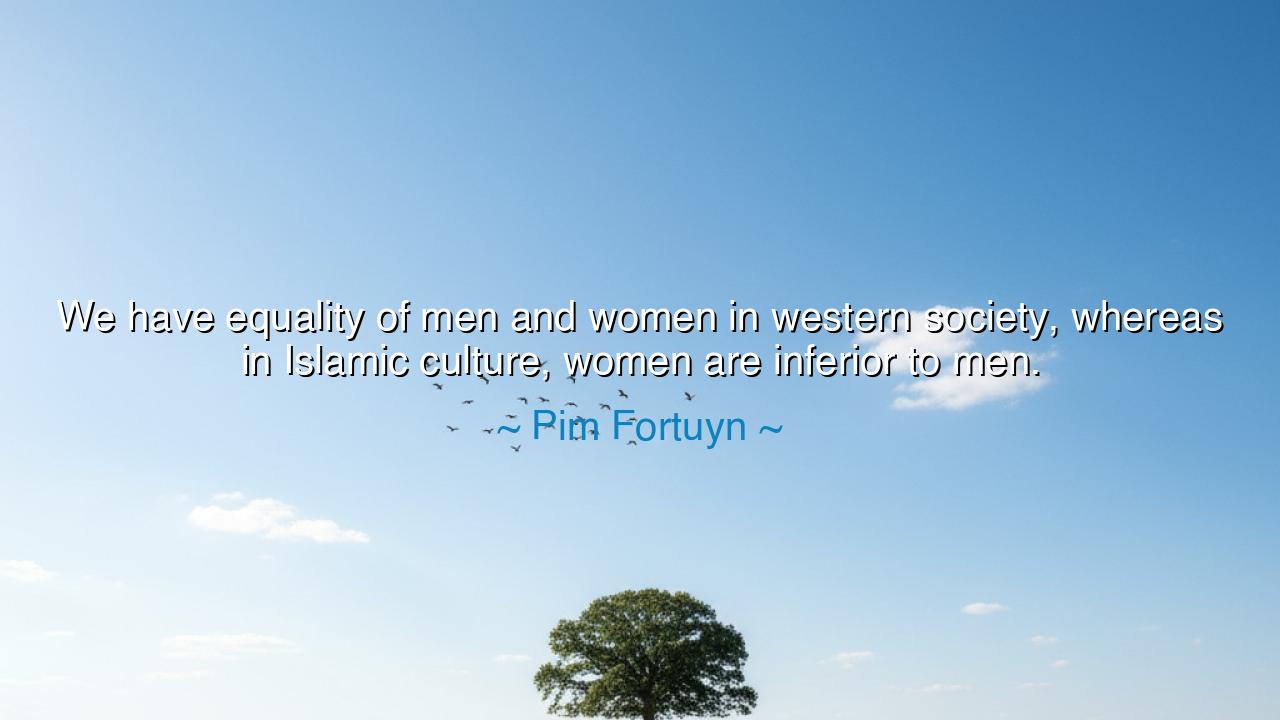
We have equality of men and women in western society, whereas in
We have equality of men and women in western society, whereas in Islamic culture, women are inferior to men.






Hear now, O listeners, the words of Pim Fortuyn, the Dutch statesman and thinker who spoke boldly of the contrast between civilizations. He once declared: “We have equality of men and women in Western society, whereas in Islamic culture, women are inferior to men.” These words, born of conviction and controversy, echo through time not as mere criticism, but as a challenge — to both East and West — to reflect upon their treatment of humanity’s two halves. Beneath his statement lies the eternal question: What is equality, and how does civilization honor it?
To understand the heart of Fortuyn’s words, one must first understand his world. He was a man of the West — of the Netherlands, a nation that has long cherished freedom of speech, thought, and personal identity. In his time, he watched as cultures met and clashed upon the same soil, and he spoke of the tensions that arise when differing values share a single land. His quote does not come from disdain, but from alarm — the fear that hard-won liberties, especially those of women, might be eroded by ideologies that do not honor them equally. Yet the wise know that such words must not be read as hatred, but as a summons to dialogue, to discernment, and to courage in defending the sacred balance of human dignity.
In the Western world, the struggle for equality was not easily won. For centuries, women lived in shadow — denied voice, denied education, denied the right to govern their own destinies. Yet through revolution, protest, and perseverance, they rose. From the pens of Mary Wollstonecraft and Simone de Beauvoir, to the courage of suffragists who chained themselves to railings and marched through jeers, the West forged its equality in fire and sacrifice. Thus, when Fortuyn spoke of this achievement, he spoke as one who revered its cost — who saw in the equality of men and women not a mere social reform, but a sacred pillar of civilization.
And yet, he cast his gaze eastward and found within Islamic cultures traditions that, in his eyes, kept women bound — veiled not only in cloth, but in silence. To him, this inequality was not merely cultural; it was moral. But let the wise tread carefully here, for Islam itself, in its earliest revelation, raised women from conditions of neglect to positions of respect and inheritance. The fault, therefore, may not lie in faith, but in the interpretation of faith by men who fear women’s power. History bears witness that even within these societies, there were women — scholars, poets, and rulers — who defied subjugation. The poet Rābi‘a al-‘Adawiyya, a mystic of Basra, spoke of divine love that transcended gender. Aisha, wife of the Prophet Muhammad, taught men the laws of faith. Thus, within every culture, there burns both darkness and light.
The essence of Fortuyn’s quote, then, is not a call to scorn another civilization, but a call to vigilance — to protect equality wherever it has been achieved, and to demand it wherever it has not. His statement reminds us that liberty, once gained, must be guarded, for it is fragile. And yet it also compels us to extend compassion, not condemnation, toward those still bound by unequal systems. For to mock the oppressed is to become oppressor oneself; but to speak truth, even when it stings, is to honor freedom’s flame.
Consider the story of Huda Sha’arawi, the Egyptian feminist who, in 1923, unveiled herself in public as a declaration of freedom. Surrounded by gasps, she lifted her veil not in rejection of faith, but in affirmation of choice. Her act spread through the Arab world like wind through dry fields. She did not wait for permission from men or governments; she embodied Fortuyn’s belief that equality must be lived, not granted. Her courage, like that of Western suffragists before her, became proof that no civilization is fixed forever — all can evolve, if guided by truth and courage.
Thus, the lesson is this: do not take equality for granted, nor assume it is complete. Where it exists, defend it; where it falters, renew it; where it has not yet been born, plant its seed. Speak not with arrogance, but with purpose — for equality is not the property of one culture, but the destiny of all humankind. It is not East against West, nor man against woman, but ignorance against understanding.
And so, my children of both sunrise and sunset, remember these words. The measure of a civilization lies not in its monuments, its armies, or its wealth, but in the freedom of its women. Where women stand tall, nations prosper; where they are bowed, nations fall. Let us then heed both Fortuyn’s warning and his hope: that a world which honors the strength and equality of all its children — male and female alike — shall stand firm, unbroken, and radiant in the eyes of history.






AAdministratorAdministrator
Welcome, honored guests. Please leave a comment, we will respond soon